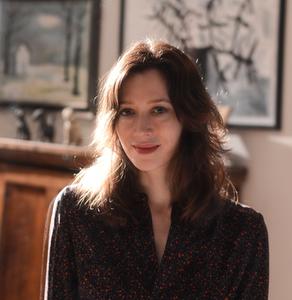 |
|
| (photo: Tobias Everke) | |
Marie Rutkoski is the author of the Winner's Trilogy, the Kronos Chronicles and The Shadow Society. Rutkoski is a professor at Brooklyn College, where she teaches Renaissance Drama, children's literature and creative writing. She lives in Brooklyn, N.Y. The Midnight Lie, the first in a planned companion duology to The Winner's Trilogy, will be available from Farrar, Straus & Giroux on March 3, 2020.
What made you want to return to the world of the Winner's Trilogy?
It was a combination of wanting to know what happened after the events of the Winner's Trilogy (The Midnight Lie is set about 20 years following the end of The Winner's Kiss) and what happened before. The main character of The Midnight Lie, Nirrim, lives on an island that has forgotten its history and has many strict laws that people follow without examining why. But readers of The Midnight Lie will notice that Nirrim's culture bears striking resemblances to a prominent culture in the Winner's Trilogy.
Why did you want to tell such a different story from those we've seen in this world before?
Really, what I wanted was to write a different kind of romance. A reader at an event for The Winner's Kiss approached me and said that she loved the character of Roshar (a young man who is gay, smart, dangerous and adores giving Arin a hard time), but that she wished there were more fantasy novels featuring queer women. There are of course many wonderful novels that offer that. Her point was that she wanted more. And so do I! I love f/f romance and when I began imagining a new book, I felt like a queer romance was the only kind I wanted to write.
Why did you want to write about magic?
In some ways, the question of magic was already there in the Winner's Trilogy. Arin, for example, believes he has been blessed by the god of death and hears that god in his mind. I was careful to have plausible deniability when writing this; it is entirely possible (and this is what Kestrel says) that Arin is so damaged that he has conjured a helpful fantasy as a way to cope. Maybe Arin is aided by a supernatural force. Maybe it's all in his head.
The Midnight Lie came partly from these questions: What if it's not all in Arin's head? What if magic did exist in this world once? Why was it there? Where did it go? Could it return?
You offer nuanced portrayals of subjugation, domination and injustice throughout the Winners Trilogy and in The Midnight Lie. Why did you want to continue exploring these themes? How did you make sure to connect with these ideas respectfully and honestly?
The Midnight Lie is in some ways inspired by one aspect of our current society: growing inequality. There have been several economic and sociological studies showing that the difference between rich and poor in this country is larger now than it has been in a very long time. The last time we've seen such a disparity, in fact, was right before the Great Depression.
The world of The Midnight Lie is one where those who have more have even more, and those who have less have even less. Wealthy people get to do whatever they want--not just with their wealth, but also with social rules. You could say that this is an allegory for being socially and economically disadvantaged in our own society.
But Nirrim's struggle isn't just with her material situation. She is also someone who is trapped in psychological ways, and has been so neatly trapped that she doesn't even see the trap. She doesn't see, in the beginning of the book, the toxicity of many of her relationships. I think that when you're in a toxic relationship (no matter what kind, in terms of family, romance, friendship) it can be very hard to see it, because you're in that relationship for a reason. You care about that other person, and you care about believing that your relationship is a good one, because who are you if it isn't? My hope is that I have thoughtfully portrayed this difficulty, and Nirrim's coming to understand the true nature of some of her relationships.
A thing I particularly loved about Nirrim is that she is without guile and wholly trusting of others, even though she doesn't trust herself. What was it like to write this character?
My books are character-driven and some of why I wrote Nirrim the way that I did is that I wanted to write a character very different from Kestrel. Kestrel is not just smart, but also extremely knowledgeable about how people manipulate each other. Nirrim is intelligent, but her life experience has been people trying to blunt that intelligence, so there is much she doesn't see or understand. But I think we all know what it's like to come to an unpleasant awareness about someone that we once trusted. I wanted to capture that in Nirrim. --Siân Gaetano, children's and YA editor, Shelf Awareness

